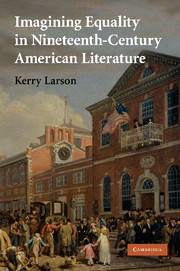PART I - BY NATURE EQUAL
Published online by Cambridge University Press: 04 May 2010
Summary
By 1835, democracy in America, according to the book of that name, had attained “an enduring and normal state.” It wasn't simply that a foreign visitor might find republican government “existing without contention, opposition [or] argument,” its basic form “accepted as one accepts the sun's course and the succession of seasons.” He might also see for himself that, comparatively speaking, the nation as a whole was “the most democratic country in the world.” Of course, the more than 3 million black Americans actually residing in the United States at the time, to name just one of many possible concerned parties, might have ventured a different opinion. Tocqueville was not unaware of chattel slavery in the South and racial oppression in the North, but he did elect to view their significance as primarily a local matter in the sense that they revealed more about the peculiarities of the United States than democracy more generally. (In this as in so much else he was guided by the interests and expectations of his French readers.) As a consequence, the long, rambling chapter that concludes Volume I of Democracy takes up the question of the three races in North America – the Native American, the African American, and the white American – from the standpoint of their likely impact on the long-term survival of the new republic. Race and the discord it excites, we are led to infer, are certainly a problem, but they are a distinctively American problem.
- Type
- Chapter
- Information
- Publisher: Cambridge University PressPrint publication year: 2008

